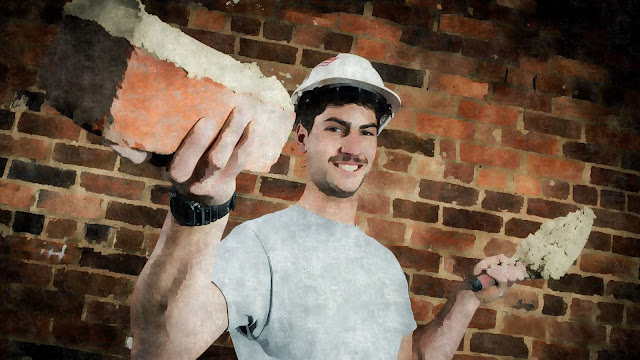If you have decided that you want to Become a Bricklayer, How do you get into the Industry?
No doubt you will have more questions regarding the process of becoming a Mason:
- Should you become a Labourer (Hod Carrier / Tender / Helper) before starting a Bricklaying Apprenticeship?
- What are Masonry Companies looking for in new employees?
- Do you even need to go through with a formal qualification and apprenticeship?
- Is it a good idea to join a bricklayers union, or contact a bricklayers association?
Although the exact process is going to be different depending on where you live, many countries have similar pathways. In fact if you live in America, the UK, Canada, Australia or New Zealand options to becoming a qualified bricklayer are basically the same.
The most common and best way to train as a brick mason is through an apprenticeship program. This means you will get paid as you learn and have a skilled bricklayer oversee your training. In this article we will cover four paths you can take to secure your masonry apprenticeship and become a qualified bricklayer. We'll look at the benefits of each option so you can determine what will work best for you.
There our many good bricklayers out there that haven't gone through apprenticeship programs, however if you plan on making bricklaying your career, I would definitely recommend it. You will open up many more job opportunities and not need to worry as the building industry tightens up its licensing.
Four Paths to become an Apprentice Bricklayer:
- Take a Job as a Bricklayers Labourer
- Straight through a Bricklaying Company
- Take a Pre Apprenticeship or Gateway Course at a Technical College
- Join a Trade Union or Contact a Bricklayers Association
1) Take a Job as a Bricklayers Labourer
Labourers are also called hod carriers, tenders or helpers depending on which country you are from. No matter what you call it laboring for a Bricklaying company is going to be really hard work. The good news is there will be a lot of work available, as good laborers are hard to hold on to. If you can show that you are willing to work hard without complaining, many masonry companies will take you on with no previous qualifications or experience.
Starting off as a labourer will teach you many useful skills for end goal of becoming a Mason. You will learn how to make the perfect brew of mortar, cut bricks and blocks safely, how to setup mortar boards and brick stacks and tool the mortar joints. It will thicken your skin and teach you how to follow instructions.
Perhaps more importantly, starting as a labourer will get you into the industry. You will be employed by a masonry company and be able to build a good relationship will with the boss and the rest of the team. You could even begin to make contacts with other bricklaying businesses in your area.
The real risk however is becoming stuck as a labourer. Because it is so hard to find good hood carriers, company owners can be hesitant to push ones on to learning to lay masonry. Even if a labourer has many years of experience, it doesn't directly translate into laying bricks and blocks well. You might see how it's done, but your training won't begin until you are on the trowel.
There are ways to avoid this eventuality. Make sure early on you express your desire to start a masonry apprenticeship. If the boss knows early on, it will give time to plan for it, perhaps finding a replacement for your laboring position. During break times ask the brickies if you can practice a bit, ask them for some Bricklaying Tips to help you Improve. If you get the feeling that you are going to get stuck as a labourer, don't be scared to move on to another company. With your labouring experience it will become a bit easier to pick up an apprenticeship with someone else.
So do you need to be a labourer before starting a bricklaying apprenticeship?
You certainly don't need to, but it will help you get use to construction sites and teach you the theory of bricklaying. Just be sure to set a time limit for being a labourer, perhaps a year.2) Straight through a Bricklaying Company
Unless you already know a contractor it can be hard to pick up an apprenticeship from cold. Especially with zero experience. That being said, it is possible.
Many masonry jobs advertised online or elsewhere will be for experienced bricklayers. If you do see one offering an apprenticeship jump at it. Most likely though you will have to search for a list of masonry companies in your area and cold call them.
If you have no masonry experience, having completed your high school certificate or equivalent will be helpful. Especially if you have done well in classes such as mathematics, hard materials design technology or technical drawing.
When speaking with the owner of a masonry business, there are a number of things to keep in mind.
Because an Apprentice will normally loose money for the first year and then only break even for the second year, it's important to show that you are in it for the long haul. Make known that bricklaying apprenticeship is something you really want to do, it's not just a snap decision.
Employers will be looking for someone that is willing to work hard and someone that can listen to and follow instructions. One reason employers may favor an apprentice bricklayer over someone already qualified is they have the opportunity to train them the way they want to. So show your eagerness to learn.
Being physically fit might help convince a boss you can handle the work. You could even buy a Few personal Hand Tools to show you are serious about becoming a bricklayer.
If you manage to get employed with a boss happy to take you on as an apprentice, it would have to be the fastest way to become qualified as a brick and block mason.
3) Take a Pre Apprenticeship or Gateway Course at a Technical College
It could be that you struggle to find a company willing to take you on with no trowel skills. An option you have is to take a pre-apprenticeship or gateway course.
These are normally short courses that are run by Technical Colleges. Most likely the same institutions that assess the certification of apprentice bricklayers.
The bricklaying class runs from a month up to a year depending on the school. I think the most valuable pre-trade courses run for about two months.
These programs will teach you bricklaying basics. They focus on teaching how to spread mortar, laying brick to a string line, building corners and returns. They will also give you an introduction to block work. The course is designed to provide an overview into bricklaying, so classes are made up mod a variety of attendees. Most will be wanting to progress into apprenticeships, but others will be DIY ers just looking for a bit of instruction for their home project.
Once you have completed your course it does make it easier to pick up an apprenticeship. Many of the colleges will now even assist you in that. They have good connections within the Industry.
From a bricklaying contractors point of view you will now be more valuable. Not so much because of your masonry skill, but because you have a good idea of what the job entails and you are still keen to go ahead.
These courses obviously have a cost associated with them, but at the end of the day it's worth if it helps you secure an apprenticeship.
4) Join a Trade Union or Contact a Bricklayers Association
Another route you may wish to think about is joining a bricklayers union. Whether or not you have a labor union for bricklayers or if they accept pre-apprentices will depend on where you live.
Once you have applied and been accepted, the union will place you as an apprentice with of their member companies. There are some benefits from joining a masonry union like good training programs and even scholarships on offer. The union will work with you to make sure you are happy with your training and make sure you get paid a fair wage.
If a supportive trade union is not available where you live, no doubt there will be a bricklayers association. Associations don't normally take applications for inspiring masons, however they do encourage their members to take on apprentices.
Try sending them an email just expressing your desire to start an apprenticeship, and ask if they know any contractors that are wanting to take someone on. The secretary of the trade association will receive your request and they will be able to contact many bricklayers. If you are nice and polite they should be happy to help out.
What does a Bricklaying Apprenticeship Involve?
Time to complete Bricklaying Apprenticeship
- America: 3 years
- UK Intermediate (Level 2): 2 years
- UK Advanced (Level 3): 13-16 months
- Australia: 4 years
- New Zealand: 8000 hours (4 years)
- Canada: 3 years
All apprenticeship programs will contain both classroom and on-the-job training. Obviously your company boss will supervise your work place training and then a bricklaying tutor will take take you through the classroom curriculum.
In a year you will spend around 2 to 3 weeks in the classroom. The testing and exams at the trade college will match your experience gained from being on the job. As you get closer to graduation the tutors will want to make sure you are competent in all aspects of masonry. Expect to be building arches, fireplace surrounds and backs, reading plans or blueprints and understanding bricklaying standards and codes for your area.
Completion of your apprenticeship will normally come with an official certification. This certificate can open up more opportunities.
Career Paths after Completion of your Bricklaying Apprenticeship
Don't expect promotions straight after completion of your apprenticeship. With only 3 or 4 years under your belt you will still be relatively inexperienced. As you gain experience and skill however you could be used for apprentice training yourself. If you have good management qualities you can progress to site supervisor or foreman.
Probably the ultimate goal for a bricklayer is to become self employed, starting a company. Controlling a business allows you to move into specialized fields of masonry, for example, heritage and restoration work or stone masonry.


